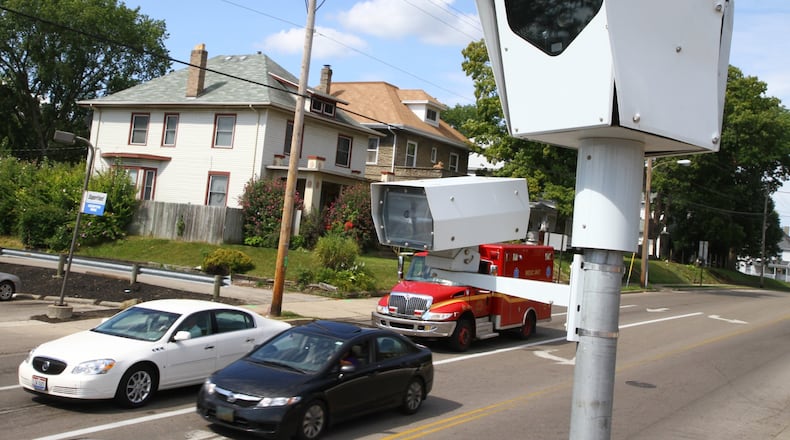Police officials wouldn’t speculate on reasons for the increased noncompliance, but said some people have figured out that the worst that will happen if you don’t pay up is a marred credit rating and harassment from a bill collector.
“There are people who know it’s not a criminal offense and they don’t care about their credit rating, so why pay,” said Springfield Police Sgt. Brett Bauer.
But, Bauer said, the cameras are deterrents. He said at the 10 intersections with cameras, the number of crashes have dropped in half.
Plenty of unpaid tickets
The News-Sun found other southwest Ohio cities with worse collection rates. In Trotwood, for example, roughly 60 percent of the scofflaws don’t pay. Dayton has more than 100 people who have racked up 10 or more tickets — five with more than 20.
Camera opponents like state Rep. Ron Maag, R-Lebanon — sponsor of a bill that would ban red light cameras as they’re used in Springfield — says this illustrates a shortcoming of the cameras: People can choose not to pay tickets with limited consequences.
“If they were pulled over by an officer, it would be a criminal penalty (not to pay up) and they would be in jail,” Maag said.
Bauer literally laughed at this idea, saying judges rarely put someone in jail for unpaid fines.
They can, however have their licenses suspended. If people don’t pay their parking tickets, Springfield police can put a block on them registering their vehicles.
That isn’t done with red light tickets because they are handled through a civil process, not the municipal court.
The city of Springfield issued 15,306 red light camera tickets between Jan. 1, 2011 and Aug. 6 this year. The cameras brought in $287,784 in fiscal year 2012.
The number of tickets issued has decreased considerably since the program began. It then increased slightly in 2012. Police officials say this is because traffic patterns have changed due to construction, and because of the addition of a sensor that detects people making prohibited right turns on red at the corner of High Street and Spring Street.
Tickets start at $100 each — half of which goes to the camera company, Redflex — then increase to $130 to help cover collections fees if not paid. This means hundreds of thousands of dollars in fines have gone uncollected.
‘I don’t care about that money’
The statewide camera ban has passed the Ohio House and moved to the Senate for discussion. Maag said his main opposition to the cameras is they don’t give drivers the ability to address their accuser.
“The camera does not come into the courtroom,” he said.
Maag said the bill would not provide amnesty for those ne’er-do-wells who have tickets piled up.
“This is to outlaw them (cameras),” he said. “It has nothing to do with what happened in the past.”
A ban on the cameras would not let anyone who’s already been issued a ticket off the hook unless the Senate added a provision extending the ban retroactively, said Tom Hagel, law professor at the University of Dayton’s law school.
“(Without that) since it was a violation at the time of the conduct, it (the ticket) stands,” Hagel said.
Bauer said more important to him is the reduction in crashes at intersections with cameras and drop in citations.
“That shows there’s a decrease in the behavior to go along with that reduction in crashes,” he said. “I don’t see that money (from paid tickets). I don’t care about that money. I care about the incidence of crashes.”
About the Author

